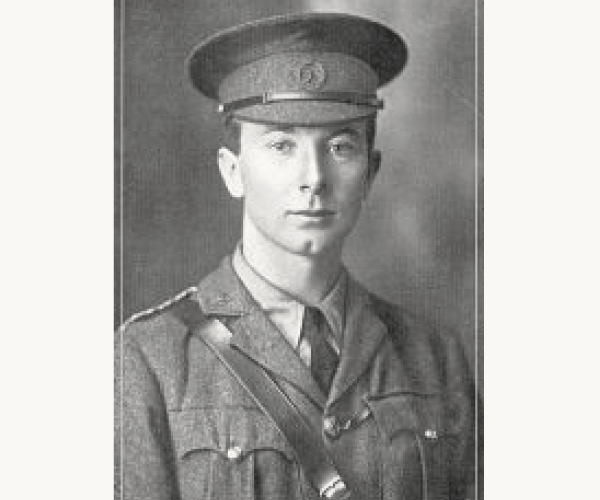WW1 Harold Gordon Allen killed at Gallipoli
Harold Gordon Allen was born on 29 July 1893 in Liverpool, England to George and Lucy Allen. His family emigrated to New Zealand before 1906 where Mr George Allen was a tea merchant and the family lived at 10 Warrington Road, Remuera.
Harold is recorded as being a pupil at Kings College, Remuera in 1906 and 1907. Whilst at college he took a deep interest in military matters and as a marksman he won the school rifle championship, and represented New Zealand in the rifle team which shot for the Lord Roberts’ trophy in 1910. He then went on to be a farm cadet at Taupiri and soldier. From school he went to Duntroon College in Australia.
Harold Allen was one of the first ten New Zealanders selected for training as a cadet at the new Military Training College, Duntroon, Australia, which opened on June 22, 1911. Harold is listed as living in New South Wales at the time, so he joined his fellow New Zealanders when they arrived in Sydney for their 2 years training. He was only 20 when he was made Second Lieutenant in the 3rd Auckland Regiment (Countess of Ranfurly’s Own).
At the outbreak of World War I both the Auckland and Northland Regiments provided a 250 man company to the 1000 strong infantry battalion that was raised from the Auckland region.
By October 1914, there were sufficient volunteers to form two brigades, the New Zealand Infantry Brigade and the New Zealand Mounted Brigade. These two formations formed the main body of the NZ Expeditionary Force and, together with the Australian 4th Infantry Brigade and the 1st Light Horse Brigade, were the basis of the New Zealand and Australian (ANZAC) Division, which fought in the Gallipoli campaign against the Turks.
Harold Allen was commissioned 5 August 1914, the day after war was declared and enlisted on the 12th August 1914 as a Second Lieutenant in the Auckland Infantry Battalion, embarking from Auckland on 16 October 1914 on Star of India or Waimana, bound for Suez, where they arrived on 3 December 1914. After further training in Egypt, they set off for the Dardanelles
From Project Gutenberg’s New Zealanders at Gallipoli, by Major Fred Waite:
On April 25, 1915, a date regarded in the Near East as the most memorable of the Great War, the New Zealand Brigade landed early in the day and fought valiantly on the northern or Suvla side of the Bay. Everything was strange and astonishing to these boys from the green, well-watered islands of the South–the enemy, the precipices, the thirst, the wounds and death around them; but no veterans have ever done better than they did during those first few hours. Then it was that they carried, occupied and held, under steadily-increasing shell and machine-gun fire, what was afterwards known as Plugge’s Plateau (from Lieut.-Colonel Plugge, commanding the Auckland Battalion), and Walker’s Ridge (from Brigadier-General Walker, General Birdwood’s Chief-of-Staff, who commanded the New Zealand Infantry Brigade at the Landing in the absence of Brigadier-General Earl Johnston, sick). These are the prosaic facts of a feat of arms which will endure as long as heroic poetry and history are written or read.
2nd Lieutenant Allen was only 21 when he was killed during the Battle of the Landing at Gallipoli. His body was later found, identified and buried in the Baby 700 Cemetery, Gallipoli Peninsula, Canakkale Province, Turkey.
In “Gallipoli – The New Zealand Story”, (p9) Christopher Pugsley quotes Lt Spencer Westmacott, who shares a cabin on the Lutzow with his friends Lts Harold Allen & Herman Stuart Baddeley, all platoon commanders of the 16th Waikato Company (AIR) :
“I had hardly turned over to go to sleep again, when the rumble of guns made me jump out of my bunk and the two others joined me at the porthole. They were the guns at Cape Helles where the 29th Division must by now be going ashore. Day was just breaking. There was a slight mist along the shore. Save for flashes from ships’ guns we could see nothing in the half light. It was nice and cool with the promise of a glorious day. It was a little after 4.00 am I said, “We may not rest so comfortably tonight. Let us go to sleep again” and we did very quickly. My words were prophetic. Before another night both my friends were dead …”
ALLEN, Second Lieutenant, HAROLD GORDON, 12/686. 16th (Waikato) Coy. Auckland Regiment, NZEF. Killed in action 25 April 1915. Age 21. Son of George Allen of 10 Warrington Rd, Remuera, Auckland, New Zealand and the late Lucy Allen of Liverpool, England. Passed examination 1st Lt. before outbreak of war and had been two years at R.M. College, Duntroon, New South Wales. D. 7. Baby 700 Cemetery.
